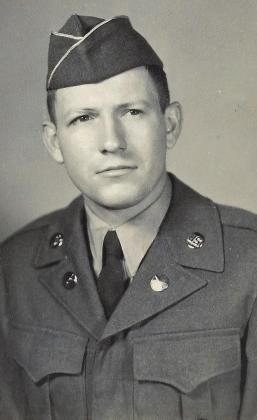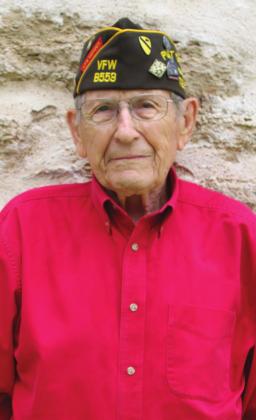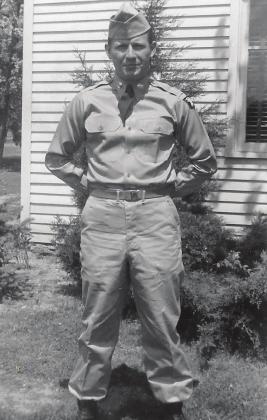Bill Beck graduated from Syracuse High School in Indiana in 1946 as salutatorian of his class and was awarded an academic scholarship as he enrolled at Indiana University. Before graduating in 1950 he was accepted into the Indiana University School of Law while majoring in political science and economics.
Following the outbreak of the Korean War in June of 1950, Beck received his draft notice in August and was inducted into the army on November 1, 1950. He was assigned to the 101st Airborne Division at Fort Breckenridge in Kentucky for basic training and Advanced Leadership School. Beck was also supposed to attend jump school, but the army cut training off early. He was then shipped to Korea and was assigned to the 1st Cavalry Division, General MacArthur’s Honor Guard during WWII.
The 1st Cavalry Division was activated in September 1921 at Fort Bliss and is unique in that it has served as a horseback cavalry division, an infantry division, an air assault division and an armored division.
The 1st Cavalry Division has been a major striking force in WWII, the Korean War, Vietnam, the Persian Gulf War, Bosnia-Herzegovina, the Iraq War, the War in Afghanistan and in Operation Freedom’s Sentinel.
“I had a very funny career in the army,” said Beck. “I had finished school and was in law school, so my whole life changed from what I was anticipating.”
Beck was among the first round of draftees in his county, and he said most of his company and battalion were college graduates.
“None of us went into line duty combat day in and day out, and when we left the ship in Japan to go to Korea, they started interviewing us to see where we would go,” said Beck.
Beck landed in Inchon in May 1951 and was sent to an ex-Japanese officer’s billet off the coast. It was a billet the Japanese used during the captivity in controlling Korea.
“I ended up being an Intelligence Specialist with the First Cav. at G-2 in Division Headquarters,” said Beck. “My assignments in both Korea and Japan were of a classified nature.”
Beck was a collector of intelligence, facts and materials he gained five different ways – through raw materials, telephone, telegraph, messages and written correspondence.
“I had to prepare reports, wrote profiles and maps for presentations for the generals and staff on a daily basis in Korea,” said Beck.
Beck said he was also sent to places in Korea to describe and define what happened and how it happened. There was also army aerial reconnaissance, and although there were times that were hot, Beck does not call himself a combat soldier.
“It was exciting, and we were shot at, but it was not terrible combat day in and day out,” said Beck. “My work was of a more intellectual level, purveying information.”
When his division left Korea, Beck said it was all garrison life and he did the same thing except he did travel around Japan.
In garrison duty, Beck said every day he would get a stack of aerial photographs and telephone and telegraph correspondence to interpret and put into report form for the generals.
“At my level, we reported all the way across the Korea battleline,” said Beck. “We plotted every battalion and every division by sector across the entire perimeter, and that was a compilation of information every day that was given to our senior officers.”
When in garrison duty in Japan, Beck said they were given snow duty exercises.
“We were put into position for exercises just like a regular division would be,” said Beck.
Beck said they wore white uniforms in snow cover and learned to ski as part of training, “just in case.”
“On weekends we were free and would go skiing and have a great ball,” said Beck.
Beck said he loved skiing and continued the sport up into his 70s.
While in both Korea and Japan Beck was offered a lieutenant commission but refused both.
“I was drafted, I accepted my duty, but I was anxious to get back and get going with what I wanted to do,” said Beck.
Beck was drafted to serve two years and served an additional four years in the reserves for his final discharge in 1956.
“I was offered to go with the First Lieutenant to Dien Bien Phu, a Frenchheld fortress in Cambodia, and had I taken it – the fort was wiped out by a bunch of rebels right after I would have been there, had I chosen to go,” said Beck.
On his way back to the U.S., Beck’s ship was caught in a typhoon.
“There’s nothing more sensational or scary than those incidents in combat, but we were strictly at the control of the captain’s capability to handle the ship,” said Beck. “We were blown way off course. We were supposed to spend two weeks in Hawaii before coming home but we didn’t get to do that.”
Once he returned, Beck had an extensive career as a civilian, earning his MBA from Butler University in 1968. He worked as an insurance claims manager and eventually rose to the position of Vice President of Administrative Corporate Claims for a multinational conglomerate in New York City. His work took him from Indiana to Illinois, Georgia and New York before he retired to Florida in 1984.
“I was born before the Depression dirt poor, yet I have become a very vain person in the sense that I have been very pleased with what I have been able to do,” said Beck. “I have had a blessed life.”
Beck returned to Texas in 2003 where he bought and operated several small ranches, one of which was located in Bosque County.
Beck is an ordained elder of First Presbyterian Church in Clifton, served two terms on the Bosque County Appraisal Review Board, was an interim municipal court judge as well as a member of the Texas Municipal Court Association, was an advisory board member of the Bosque Arts Center, a lifetime member of the VFW Post #8553 where he serves as Chaplain, and a member of the American Legion Post #322.
When asked why it was so important for veterans to join organizations like the VFW and American Legion, he said it was important for veterans “to represent the American military and stand up and be absolutely proud of being ex-military, and to promote the spirt, integrity and guts of the military.”
“I committed myself, but I didn’t have the worst,” said Beck. “I was lucky.”
With Memorial Day just around the corner, Beck said it’s important for everyone to recognize those who gave their all.
“Those who committed themselves to defend - it’s an honorable thing as an individual to commemorate both the living and the dead for what we were handed to do, expected to do and did do,” said Beck.
“I’m just one of the guys,” said Beck. “But I’m one of the guys who had a blessed life.”



